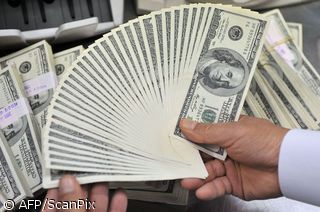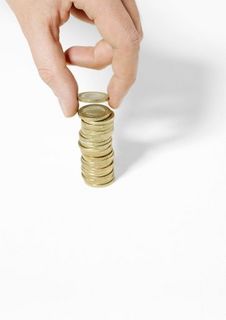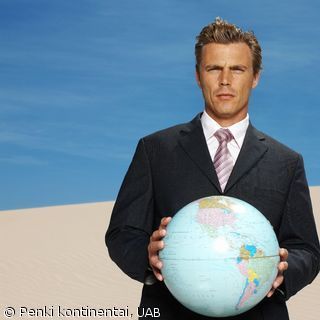It is the only source that can provide a chance for economic breakthrough
Published:
21 March 2005 y., Monday
Money from Russia’s Stabilisation Fund is expected to be invested abroad in dollar-nominated securities, with minimum investment risks and minimum profitability at 2-4%. These funds have until now been kept in Central Bank accounts. This means that a great deal of money will soon appear on the financial markets. On February 1, 2005, the Fund totaled 647.2 billion roubles ($23.1 billion), which mostly came from taxes on oil sales with prices exceeding $20 per barrel and export duties from oil companies.
The crucial question is how this money should be used. Money can only be taken out of the Fund when it has more than 500 billion roubles. Therefore, more than a fifth of its resources can already be used. This is a key issue for Russia’s economy, as the positive overseas market situation in recent years has been almost exclusively responsible for its growth.
However, experts are not tired of repeating that the potential of the resource-oriented Russian economy has been virtually exhausted. The mechanism whereby "we produce oil, sell it and enjoy the benefits" is becoming increasingly less effective. The country is now at a stage when it must introduce an industrial policy. However, any policy only makes sense when there is money to implement it.
Russia’s stock market and banking system do not provide the necessary financing for the real sector of the economy. Direct foreign investment in Russia remains at a very low level, while foreign investment in general is concentrated on either the import of equipment or foreign borrowings. The country obviously needs sources for further growth. The Stabilisation Fund is virtually the only potential source today and a genuine war is being waged for its funds.
Šaltinis:
financialexpress.com
Copying, publishing, announcing any information from the News.lt portal without written permission of News.lt editorial office is prohibited.
The most popular articles
 The European Commission has approved an application from Spain for assistance under the European Globalisation adjustment Fund (EGF).
more »
The European Commission has approved an application from Spain for assistance under the European Globalisation adjustment Fund (EGF).
more »
 Green issues continue to dominate the headlines, as MEPs from the Transport Committee vote Wednesday on possible new charges for lorries, based not only on CO2 emissions but other factors such as noise and air pollution and congestion.
more »
Green issues continue to dominate the headlines, as MEPs from the Transport Committee vote Wednesday on possible new charges for lorries, based not only on CO2 emissions but other factors such as noise and air pollution and congestion.
more »
 High level representatives from business, higher education and politics are meeting in Brussels on 5-6 February for the 2009 European University-Business Forum.
more »
High level representatives from business, higher education and politics are meeting in Brussels on 5-6 February for the 2009 European University-Business Forum.
more »
 Bailoutbooth.com is doling out $50 and $100 bills to anyone over 18 who can explain why they need it.
more »
Bailoutbooth.com is doling out $50 and $100 bills to anyone over 18 who can explain why they need it.
more »
 China's big three airlines are predicting a bumpy ride for 2009. With the global economic slowdown, failing passenger demand and cost pressures, all three carriers are feeling the credit crunch's bite.
more »
China's big three airlines are predicting a bumpy ride for 2009. With the global economic slowdown, failing passenger demand and cost pressures, all three carriers are feeling the credit crunch's bite.
more »
 The Czech EU Presidency aims to give a new impetus to European car industry, a key sector that has been seriously hit by the global economic crisis.
more »
The Czech EU Presidency aims to give a new impetus to European car industry, a key sector that has been seriously hit by the global economic crisis.
more »
 Opening a new front in the fight against climate change, cities across Europe vow deeper emission cuts.
more »
Opening a new front in the fight against climate change, cities across Europe vow deeper emission cuts.
more »
 Taking into account changes on international and domestic money markets AB DnB NORD Bankas, a member of international financial group, has changed individual and corporate customers time deposit rates.
more »
Taking into account changes on international and domestic money markets AB DnB NORD Bankas, a member of international financial group, has changed individual and corporate customers time deposit rates.
more »
 A European Commission report shows that structured dialogue between workers' and employers' representatives can help the EU face the economic crisis.
more »
A European Commission report shows that structured dialogue between workers' and employers' representatives can help the EU face the economic crisis.
more »
 Dennis Kozlowski, the ex-Tyco CEO who spent 6 thousand dollars in company money on a shower curtain, has plenty of company today in the corporate shame game.
more »
Dennis Kozlowski, the ex-Tyco CEO who spent 6 thousand dollars in company money on a shower curtain, has plenty of company today in the corporate shame game.
more »